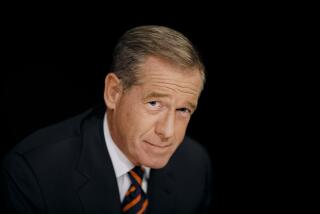Case Shines Harsh Light on ‘Pundit Industry’
- Share via
If the public was not already doubtful about the independence of the pundits who jam 24-hour news stations, it may become so following the revelation that a popular conservative commentator was paid $240,000 to promote President Bush’s No Child Left Behind Act.
Several media analysts said the disclosure Friday that Armstrong Williams had a contract to promote the education law should cause reexaminations on several fronts: government in its use of tax money to promote political causes, news outlets in screening opinion makers for bias, and news consumers in scrutinizing information thrown their way.
“There is a declining public trust in the media as a system, and I think this is a really troublesome ethical issue,” said Nancy Snow, a professor of communications at Cal State Fullerton. “It could become a larger issue if the public across the board says that all these media celebrities need to be more forthcoming about what they are getting paid to say.”
Marty Kaplan, associate dean of USC’s Annenberg School for Communication, said such problems had been spawned, in particular, by the desire of 24-hour television news programs to fill their broadcasts with experts and commentators.
“The pundit industry has exploded with people setting themselves up as authorities and cloaking themselves in the values of journalism, where in fact all they are doing is promoting a brand, which is themselves,” Kaplan said.
In response to news about the payment, Williams lost his contract with Tribune Media Services, the syndicate that carried his weekly column to several dozen newspapers. The executive who manages the syndicate for Tribune Co., the parent company of the Los Angeles Times, said Williams failed to disclose that he was being paid by the Department of Education.
Among the papers that received Williams’ columns through the syndicate were the Washington Times, the Detroit Free Press and the Seattle Times, according to his website.
A spokeswoman for CNN, which frequently uses Williams as a conservative voice on its news programs, said the cable network should have been notified about Williams’ relationship with the Bush administration.
“We will seriously consider this before booking him again,” said spokeswoman Edie Emery.
NBC spokeswoman Allison Gollust said that if the network’s programs used Williams again, they would first identify his relationship with the Department of Education “as in the case of any of our interviewees on something they are being paid to promote.”
Williams spent a long day and night Friday apologizing for what he admitted was an ethical lapse.
The 45-year-old son of South Carolina tobacco farmers wears multiple professional hats -- radio and television talking head, newspaper columnist, public relations executive, book author and television producer.
“I am a pure entrepreneur, and I made a business decision,” Williams said of the $240,000 contract. “I didn’t think about the dual role of media pundit and entrepreneur. And if I had to do it again I would do it differently, because it is much more important to me -- my reputation with my peers and with the public.”
Williams said it was only after being interviewed by journalists Friday that he realized many major news outlets had disclosure requirements to ensure that their employees avoided such conflicts of interest.
He said he had “no doubt” that other commentators had similar ethical dilemmas that simply hadn’t been publicized.
More to Read
The biggest entertainment stories
Get our big stories about Hollywood, film, television, music, arts, culture and more right in your inbox as soon as they publish.
You may occasionally receive promotional content from the Los Angeles Times.











